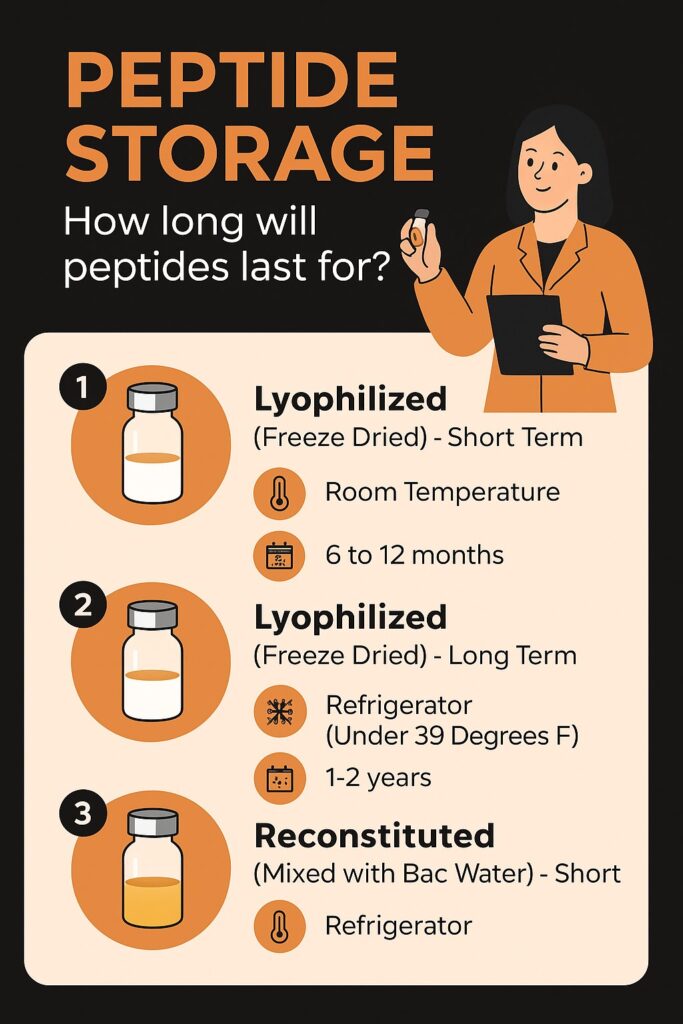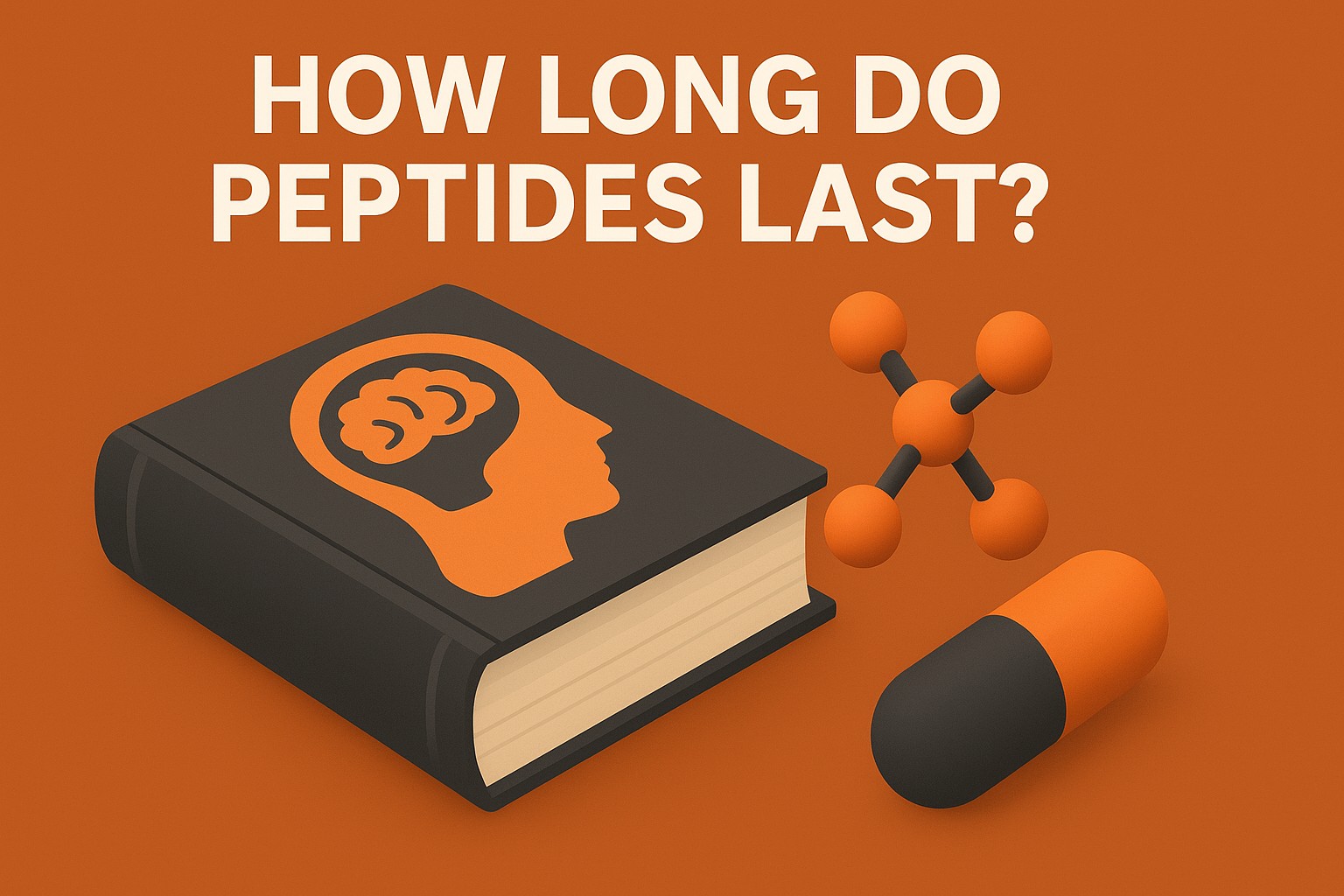Peptides play a crucial role in science, medicine, and research, but many researchers still wonder: How long do Peptides Last? The answer depends heavily on storage conditions, temperature, peptide composition, and whether the peptide is in powdered or reconstituted form.
In this comprehensive guide, you’ll learn exactly how long Peptides Last, how to store them correctly, and what factors reduce or extend their stability.
Introduction to Peptide Stability and Why It Matters
Peptides are delicate molecules built from amino acids, and their structure can degrade when exposed to heat, light, moisture, or oxygen. Knowing how long Peptides Last helps ensure accurate research outcomes and prevents costly product loss. Many peptides degrade prematurely simply due to improper handling or storage issues that are entirely preventable.
This guide breaks down everything you need to know, from powdered peptide shelf life to reconstituted peptide safety.
What Determines How Long Peptides Last?

A peptide’s lifespan is influenced by several key factors that govern its chemical stability.
Amino Acid Composition and Its Impact
Some amino acids make peptides more vulnerable to degradation. For example:
- Cysteine (Cys) is prone to oxidation
- Methionine (Met) oxidizes easily
- Tryptophan (Trp) degrades with light and oxygen exposure
Peptides containing these residues generally have a shorter lifespan, especially in liquid form.
Environmental Factors That Speed Up Degradation
Conditions that shorten how long Peptides Last include:
- High temperature
- UV or fluorescent light exposure
- Moisture and humidity
- Reactive oxygen species (ROS)
Even tiny amounts of moisture can trigger hydrolysis in certain peptides.
Choosing the Right Storage Containers
- Container choice also determines how long your peptides will last:
- Glass vials: best for long-term storage
Polypropylene tubes: suitable for transportation but less stable over months or years
Proper container choice can extend shelf life significantly.
How Long Do Powdered Peptides Last?
Powdered peptides especially when freeze-dried can remain stable for years, making them ideal for long-term research storage.
Room Temperature Shelf Life
At 68–77°F (20–25°C), powdered peptides may start to degrade within:
- Weeks to months, depending on their sequence
- Exposure to humidity dramatically reduces lifespan
This environment is not recommended for peptides that must remain highly stable.
Refrigerated Shelf Life
When stored at 36–46°F (2–8°C), most powdered peptides remain stable for:
- 1–2 years
Refrigeration slows oxidation and hydrolysis dramatically.
Frozen Shelf Life
Freezing provides the longest shelf life:
- -20°C (–4°F): 2–3 years
- -80°C (–112°F): 5–10+ years
Studies show peptides frozen at –80°C can remain nearly unchanged even after a decade.
Why Lyophilized Peptides Last Longer
Lyophilization stabilizes peptides by removing water through sublimation. Without water, peptides are far less reactive.
Reduced Water Activity
Water enables hydrolysis and enzymatic degradation. Lyophilized peptides avoid this.
Controlled Oxidation Exposure
Peptides stored in vacuum-sealed or inert-gas-sealed vials minimize contact with oxygen, extending how long Peptides Last.
How Lyophilized Peptides Still Degrade Over Time
Even freeze-dried peptides can degrade. Common degradation pathways include:
Oxidation Risks
Peptides containing Met, Cys, or Trp oxidize more rapidly.
Aggregation Issues
Hydrophobic residues may cause peptides to clump, reducing their effectiveness.
Deamidation Processes
Asparagine and glutamine can slowly convert to acidic forms, especially when exposed to heat or moisture.
How Long Do Reconstituted Peptides Last?
Once reconstituted, peptides become chemically “active” again and degrade much faster.
Stability in the Refrigerator
Most reconstituted peptides last:
- 30–60 days at 4°C (39°F)
- Some more unstable peptides may last only 1–2 weeks
Stability in the Freezer
At –80°C (–112°F):
- Stability increases up to 6–12 months
- Must avoid multiple freeze–thaw cycles
Choosing the Right Buffer and pH
Sterile buffers between pH 5–6 help maximize stability. Avoid pure water unless required—it accelerates degradation.
Looking to Buy Tirzepatide in Philippines Check this one out now!
Best Practices to Ensure Peptides Last as Long as Possible
Preventing Moisture Exposure
Moisture-sensitive peptides should be stored in:
- Desiccators
- Vacuum-sealed containers
- Low-humidity environments
Avoiding Light-Induced Damage
UV exposure can cause photodegradation.
Store peptides in:
- Amber vials
- Aluminum-wrapped containers
- Dark storage boxes
Minimizing Freeze–Thaw Cycles
Aliquot solutions before freezing to avoid degradation from repeated thawing.
Storage Comparison Table: Powdered vs. Reconstituted Peptides
| Storage Type | Room Temp | Refrigerated | Frozen (-20°C) | Frozen (-80°C) |
|---|---|---|---|---|
| Powdered Peptides | Weeks–Months | 1–2 Years | 2–3 Years | 5–10+ Years |
| Reconstituted Peptides | 24–72 Hours | 30–60 Days | 3–6 Months | 6–12 Months |
Frequently Asked Questions About How Long Peptides Last
1. How long do powdered peptides last?
Powdered peptides can last:
- Up to 1 year at room temperature
- 1–2 years refrigerated
- Up to a decade when stored at –80°C
2. How long do peptides last in the fridge?
- Lyophilized peptides last up to two years.
- Reconstituted peptides last 30–60 days.
3. How long do reconstituted peptides last in the fridge?
- Typically 30–60 days, depending on peptide composition.
4. How long do peptides last at room temperature?
- Lyophilized peptides last up to one year.
- Reconstituted peptides should be used immediately or chilled.
5. How long do peptides last once reconstituted?
- About 30 days in the fridge and 6–12 months at –80°C.
6. What’s the best way to make peptides last longer?
- Use airtight glass vials, freeze at –80°C, avoid light, and aliquot solutions.
For an additional scientific reference, visit:
External Link: https://www.sigmaaldrich.com
Conclusion: Maximizing Peptide Shelf Life for Better Research Results
Understanding how long Peptides Last empowers researchers to store, handle, and use peptides more effectively. By controlling temperature, moisture, light, and oxidation, peptides can remain potent for years—sometimes even decades.
Whether you’re storing powdered peptides or working with reconstituted solutions, following the right storage techniques ensures consistent results and prevents costly degradation.


